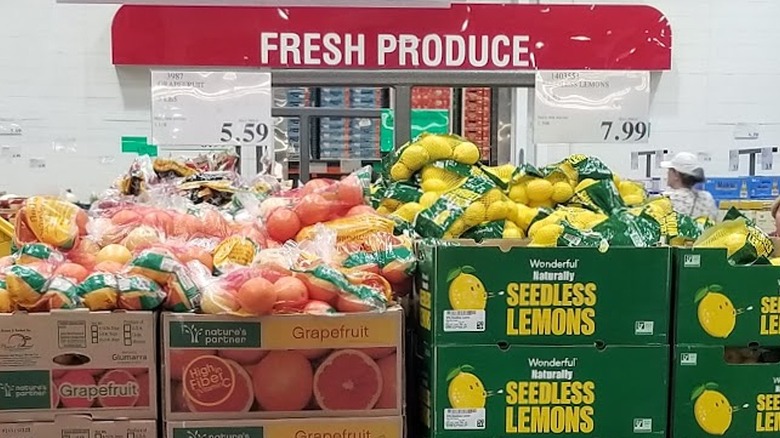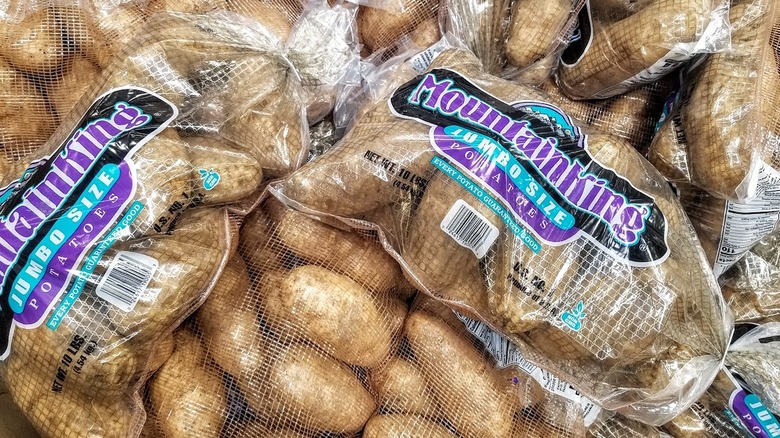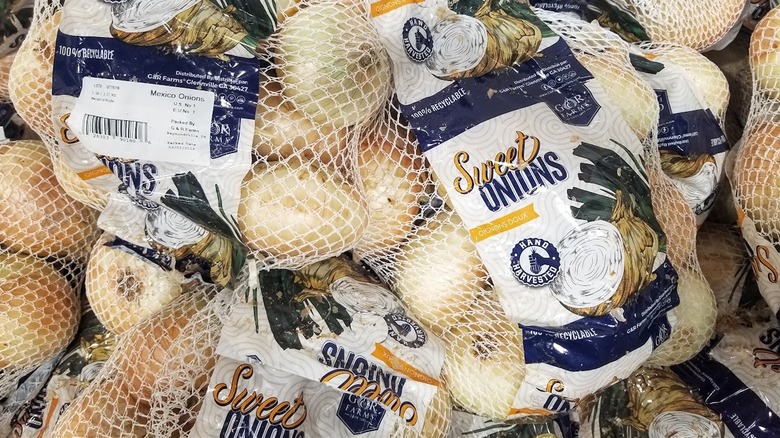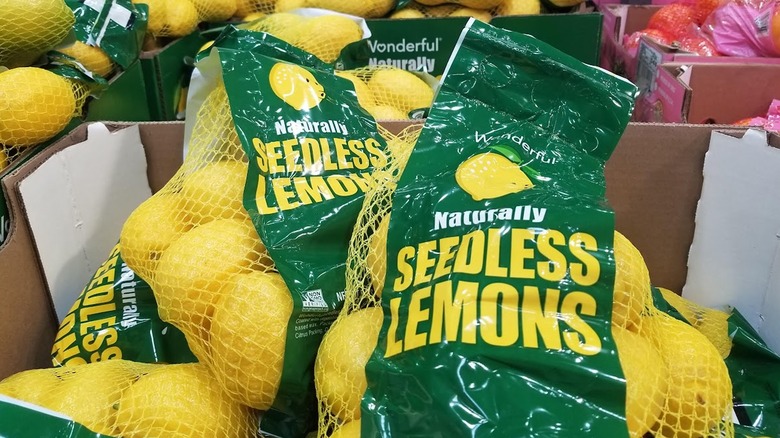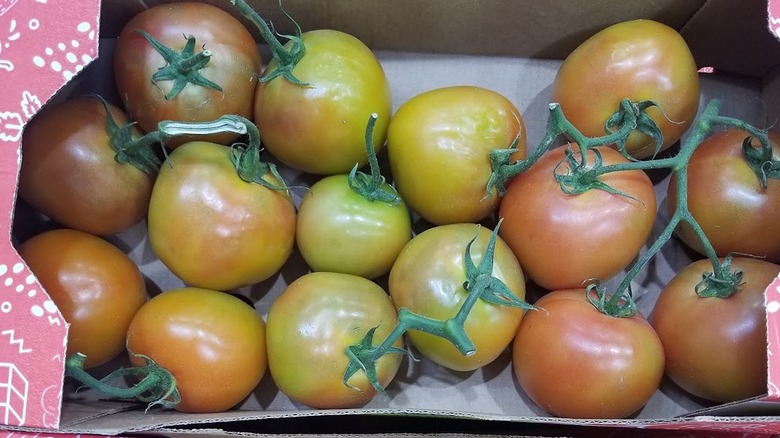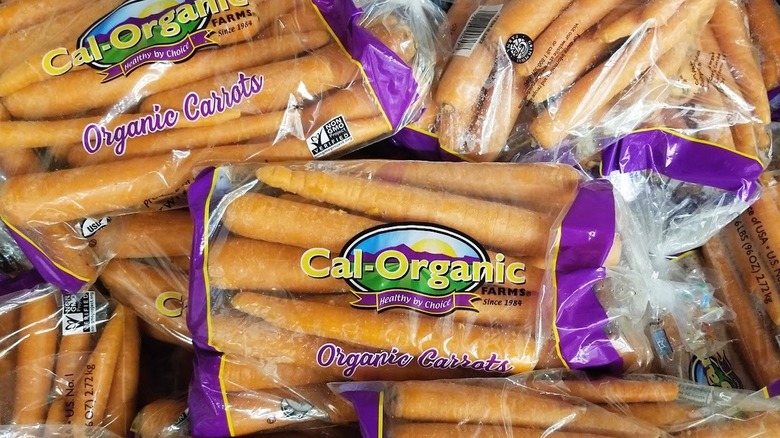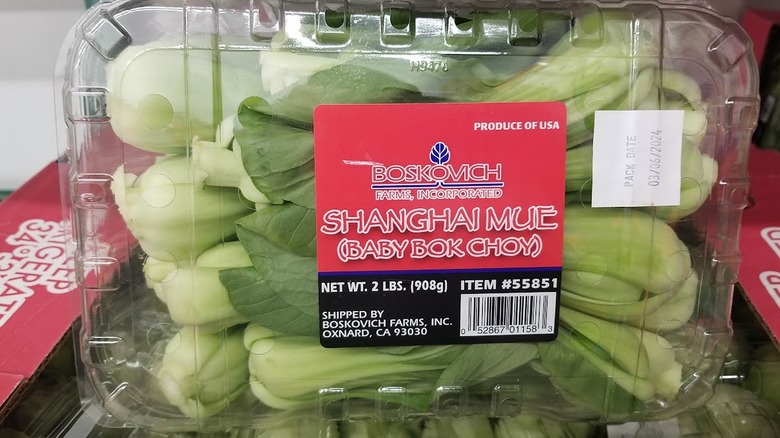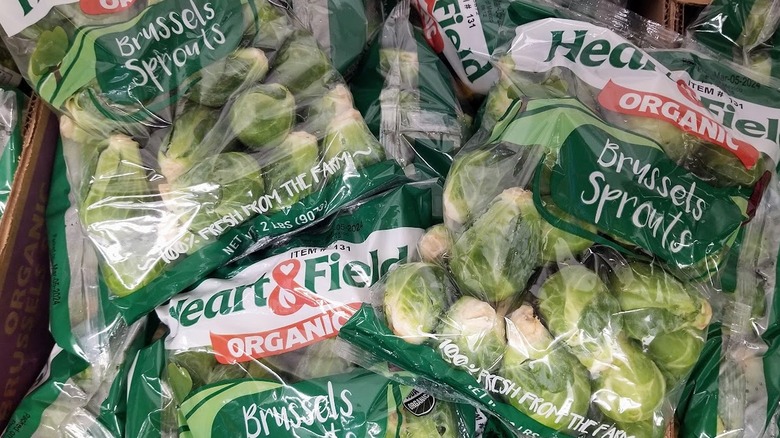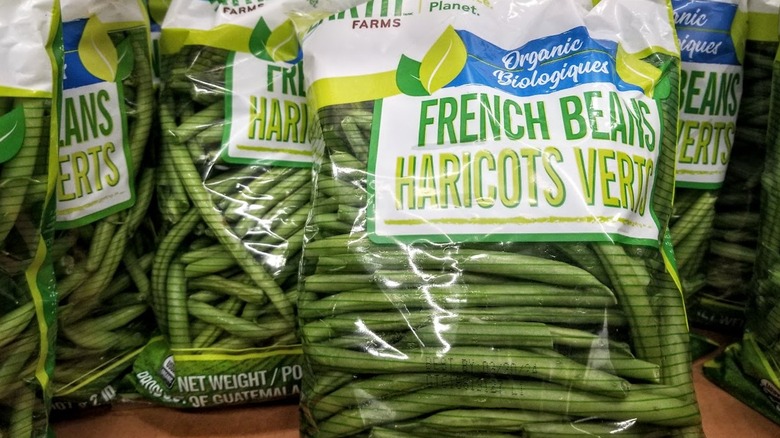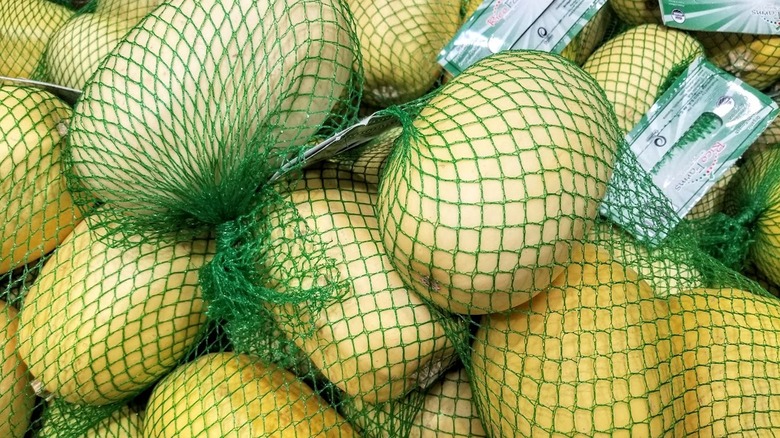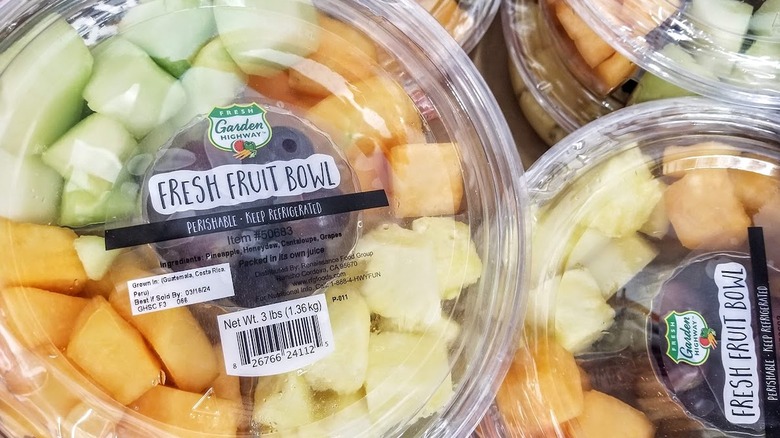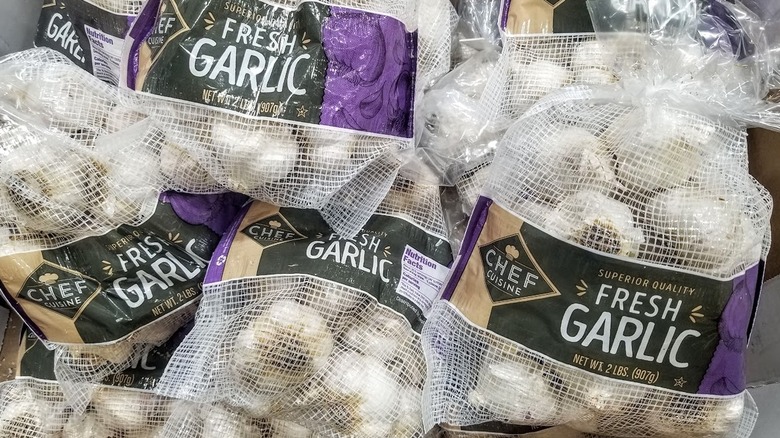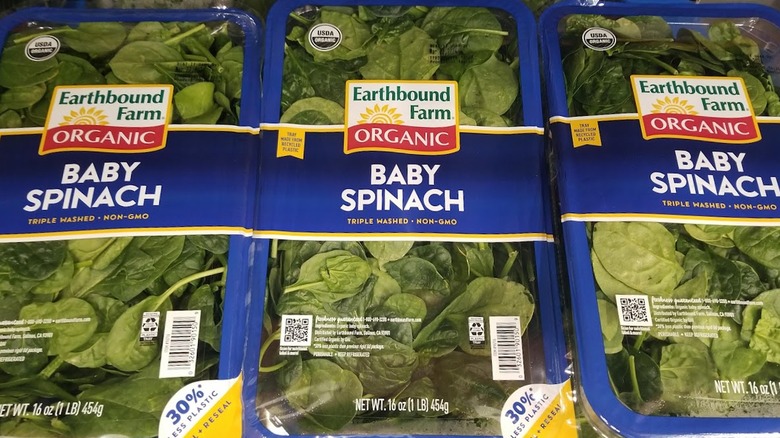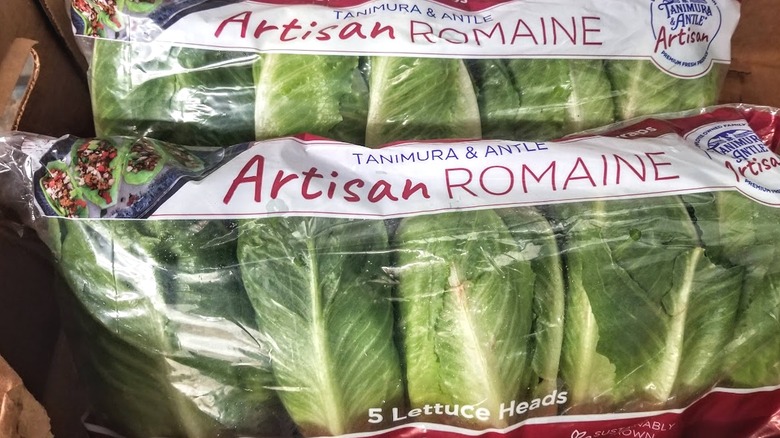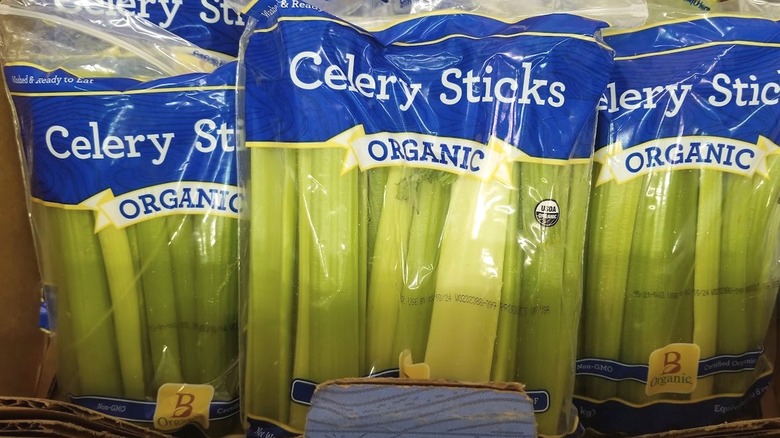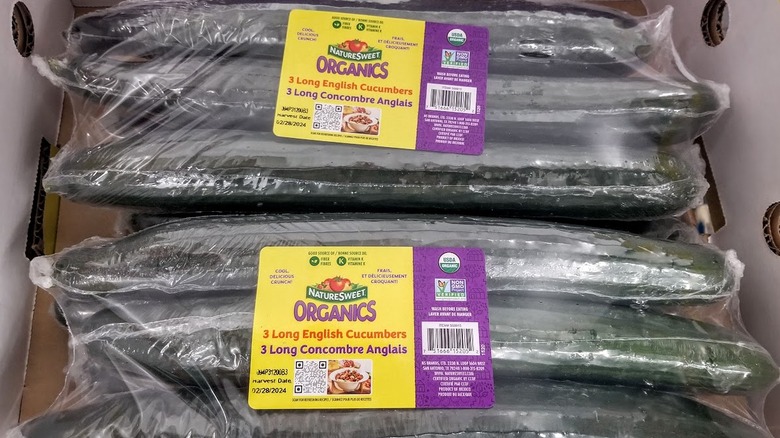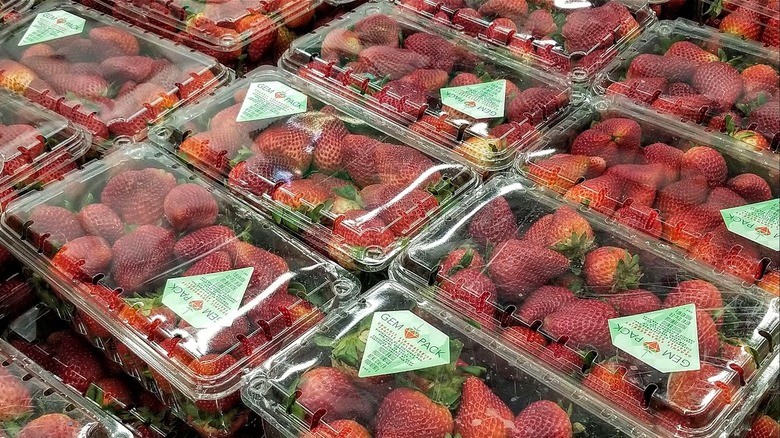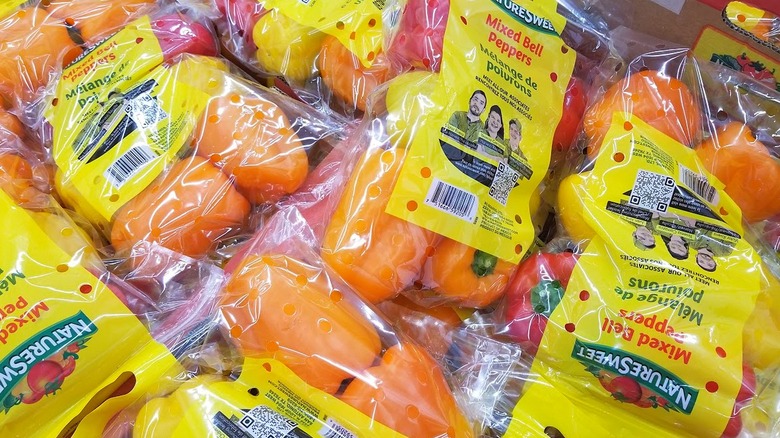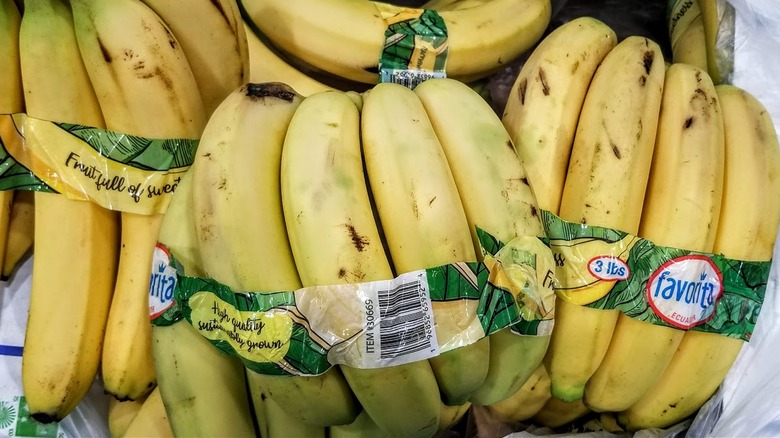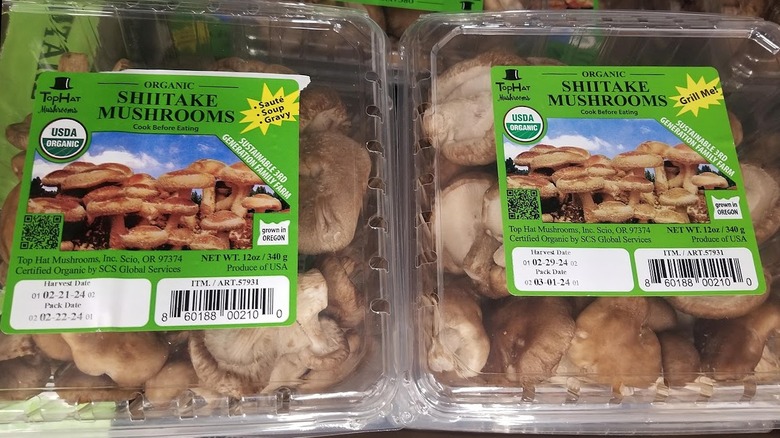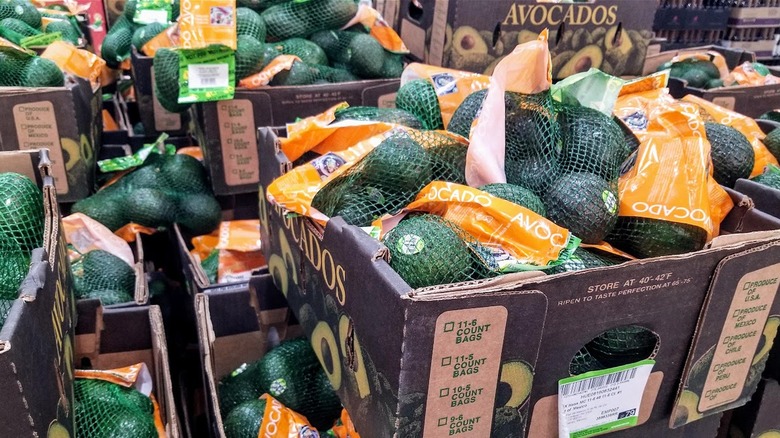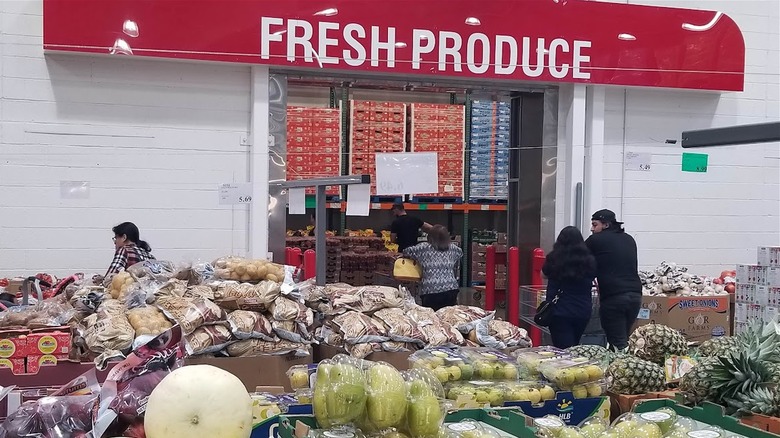10 Fresh Produce Must-Buys At Costco And 10 To Skip
There are many reasons to love shopping at Costco. The wholesaler lets you stock your kitchen, home bar, and cleaning cabinet with all sorts of household essentials, including an assortment of pantry, fridge, and freezer foods. This membership-only club does this while keeping its prices lower than other retailers by selling items in bulk. Buying large quantities of shelf-stable products, like canned chicken, energy drinks, or protein bars, is a smart buy at Costco. Even some fresh produce will last for months in the pantry or refrigerator, making Costco a great place to buy it as the prices are often lower than you will find elsewhere.
Some of the big box store's fresh produce, however, should be left on the shelf. It can be delicate, bruise easily, or spoil quickly, resulting in food waste if you cannot finish it before it expires. To help decipher between the worst and the best, I visited my local Costco, checking the store's inventory and assessing the quality of its fresh fruits and vegetables. Armed with that knowledge, here's a list of fresh produce you should buy and what you should skip during your next Costco trip.
Prices are as of the date of publication and may vary based on region.
Buy: Russet potatoes
The shelf life of potatoes varies by type, but whole russet potatoes have a shelf life of several months when kept in a cool, dark place with good air circulation. This makes potatoes a fantastic buy at Costco, particularly for the price. A 10-pound bag of russets was available at our local store for less than $5.00, a couple dollars in savings over typical grocery stores.
To ensure you have a chance to use up the whole bag before they spoil, it's best to keep the nightshade tubers in a well-ventilated basket or paper bag in a pantry, away from ethylene-emitting produce, like onions. Remember to inspect each potato before placing them in the basket and remove any that look damaged or bruised. By doing this, you have plenty of time to enjoy them in your favorite potato dishes, like luxurious fondant potatoes.
Skip: Onions
Home cooks know the importance of having an onion on hand. Adding sliced or diced onions to a dish while cooking elevates the taste, adding a sweet, earthy, nutty flavor to whatever you're making. Knowing this, picking up one of Costco's giant bags of onions may be tempting, especially for the price — less than $1.00 a pound at our Costco location. However, we suggest refraining from the purchase.
Onions emit ethylene gas, which can cause other fruits and vegetables, like avocados, potatoes, and bananas, to spoil. Therefore, the allium must be stored separately, ideally in a cool, dark, well-ventilated space away from moisture, light, and heat. Moisture causes vegetables to soften, sprout, and begin decaying. While a sprouting onion is safe to eat, its texture and flavor will change, becoming less sweet and crisp as those of a non-sprouting onion, as the vegetable uses stored sugars to produce the sprout.
If you have a dry root cellar, cool pantry, or basement with constant cool temperatures, you may be able to use the onions before they spoil. However, if not stored properly, you risk wasting a portion of the onions you bought.
Buy: Citrus
When entering the produce section at Costco, the wholesaler welcomes you with a mountain of citrus fruit bags. Navel oranges, seedless lemons, and juicy mandarins are among those piled high and priced to be taken home. Though those bags are large, and citrus is best stored in the refrigerator, these fruits are excellent to buy at Costco, at under $1.00 a pound for navel oranges and ruby red grapefruit.
When properly chilled, citrus fruits have a long shelf life, about three weeks to a month. If that still isn't enough time to finish the fruit, you can always zest and juice it to freeze and have on hand when needed. If you don't have room in the fridge to store the fruit, place it on the countertop, where it will last about a week, releasing fragrant, citrusy freshness into the air.
Skip: Vine ripe tomatoes
Nothing is more flavorful than the taste of a freshly picked, sun-ripened tomato straight from the garden. Tomatoes are a fruit best enjoyed when in season, typically during the warm summer months.
Nevertheless, Costco sells tomatoes on the vine throughout the year at a cost that is slightly less than the per-pound price at many grocery stores. However, we wish they didn't, as was evident on our recent Costco visit, where we saw multiple boxes of unripened, hothouse-grown vine tomatoes. The fruit lacked the bright ruby-red hue that makes our mouths water, instead looking bruised with a greenish-yellow tinge, indicating the picking and packaging occurred well before beginning to ripen. Tomatoes picked before achieving maturation won't develop their full sweet and juicy flavor — and this won't improve either, even if left to ripen on the counter or windowsill. So it's best to skip the selection.
Buy: Carrots
Whole carrots are some of the most nutritious vegetables to enjoy. They have eyesight-boosting beta-carotene, fiber, potassium, and other vitamins and minerals. These veggies are also highly inexpensive at Costco, with a giant 6-pound bag of organic carrots costing under $3.50 at our local store. The bag size may deter you from buying the carrots at Costco, wondering how it will fit in your fridge.
The good news about the root vegetable is that carrots don't require refrigeration to stay fresh. Though keeping whole carrots packed in water in a sealed jar chilling in the fridge will extend their shelf life to over a month, storing carrots in a cool, dark environment, like a root cellar or basement, will keep the orange vegetable fresh for several months. Just remember to keep carrots moist, packing them in damp sand to help maintain their crunch.
Skip: Baby bok choy
The Chinese cabbage bok choy is one of the most nutrient-dense foods you can enjoy. The low-calorie leafy green provides high levels of vitamins C and K, is thought to help reduce cholesterol, and has cancer-fighting properties. The vegetable is interchangeable with fully grown bok choy, containing the same nutritional values, with the baby option tending to be sweeter and more tender. It also has a long shelf life of up to two weeks if adequately kept dry and cool in a refrigerator, which may lead you to want to purchase the membership club's baby bok choy.
However, we suggest skipping the cabbage on your next trip to Costco. Costco's pricing is similar to what you can find at national grocery stores: $6.99 for a 2-pound box. As the best way to maintain freshness is in the crisper drawer, buying the bunches in bulk will take up valuable refrigerator real estate.
Buy: Brussels sprouts
Crunchy organic Brussels sprouts are a great buy at Costco. Two pounds of sprouts are available for under $5.00, a bargain compared to a typical grocery store.
When stored correctly in the refrigerator, the cabbage-like vegetable with layers of leaves tightly packed together has a shelf life of up to two weeks, giving you plenty of time to make a delicious side dish of balsamic roasted Brussels sprouts or a hearty shaved Brussels sprouts salad. You will want to transfer the sprouts from the packaging in which they are sold to an air-tight container to ensure they remain moisture-free. Moisture will cause the vegetable to lose its firm texture, becoming soft and mushy.
Skip: French-style green beans
Green beans are heart-healthy, low-calorie vegetables. The beans are a star ingredient in the Thanksgiving favorite green bean casserole and are also quickly sauteed with butter to create a delicious accompaniment to any protein. The vegetable's versatility and affordable price of two pounds for under $5.00 may have you considering picking up the package of organic French green beans at Costco.
However, we suggest skipping the product unless you're prepping your holiday casseroles. Green beans have a short shelf life of only five to seven days after harvest under refrigeration. The beans are also packaged in a sealed plastic bag, where moisture can accumulate, creating a scenario in which mildew can grow, turning the beans slimy. Instead, pick up a bag of Kirkland Signature frozen organic green beans, which can last for months in your freezer.
Buy: Winter squash
Late-harvested winter squash, like spaghetti, butternut, and sweet dumpling squash, is a nutrient-rich food that is low in calories and carbohydrates and high in antioxidants. The squash is technically a part of the fruit family. It has a thick outer skin that protects the fruit during its growing season, allowing it to ripen slowly.
This thick rind also insulates the inner flesh after harvest, allowing winter squash to stay fresh for several months when stored in a cool, dry pantry. The long shelf life makes winter squash a great buy at Costco. You will be happy you have it when you get an unexpected spaghetti squash pad Thai craving.
Skip: Fresh fruit bowl
Buying a pre-cut fresh fruit bowl, like Costco's offering of cantaloupe, honeydew, pineapple, and grapes, seems like a great shortcut. It avoids the mess of breaking down a whole melon or pineapple while saving time and helping you get your daily dose of fruit. Unfortunately, buying and eating a pre-cut fruit package may be risky to your health. Melons are prone to picking up bacteria, like salmonella, in the fields where the fruit grows.
Washing whole fruit can remove bacteria before cutting the melon. However, there are no firm standards in America for preparing pre-cut fruits, meaning that if bacteria is on the rind when cutting the melon, it will likely be transferred onto the flesh and into the packaging container, spreading to the other fruits in the bowl. Considering the bowl's high price of $11.99 and potential health risk, we recommend buying whole fruit instead.
Buy: Whole garlic bulbs
If you see bags of whole fresh garlic bulbs in the produce section of Costco, put a few in your basket immediately. Cuisines worldwide utilize the plant's bold tastes and aromas to liven up their dishes. Using fresh cloves while cooking adds a punchy, spicy, earthy taste that will enhance the flavor of any dish, from simmered garlic butter chicken to seasoned taco meat or spicy Asian noodles.
Garlic is also good for your health. Adding the allium to your diet is thought to help the immune system, fight dementia, and lower blood pressure and cholesterol. The best part is whole garlic bulbs have a shelf life of up to six months when stored on the counter or in a dry pantry, making Costco's 2-pound bag of garlic easy to recommend.
Skip: Leafy greens
Eating a mix of leafy greens, like kale, spinach, and collard greens, is a great way to boost your immune system, fight heart disease, and reduce the risk of certain types of cancer. However, you should likely skip the powerhouse greens packed with vitamins and minerals at Costco unless you eat a mixed greens salad every day. Otherwise, there is a high likelihood that the bulk-buy box of organic spring mix or baby spinach will wilt before you finish the container.
Pre-packaged greens have a shorter use-by date versus buying whole heads of lettuce. Though bacteria can grow on all leafy greens and cause foodborne illnesses, like listeria and E. coli, pre-packaged lettuces undergo more processing during packaging, making them more susceptible. Though these Costco items are well-priced, we suggest skipping the greens.
Buy: Artisan romaine heads
Unlike delicate spinach and spring mix greens, Costco's artisan romaine heads will last an extended time in your refrigerator, from two weeks to 20 days with proper storage. This makes the five-count package a great buy, especially for the price of under $5.00 at our local store. The difference is that the outer leaves of the lettuce protect the inner leaves, keeping the inner lettuce fresh.
The artisan lettuce heads are also smaller than fully grown romaine. This makes them the perfect size for a tuna lettuce wrap or to top a burger.
Skip: Celery sticks
We suggest avoiding Costco's pre-cut organic celery package. The wholesaler's bagged celery is expensive compared to other grocery stores options. It also comes packaged in a sealed plastic bag, which traps the ethylene gas the vegetable produces inside. The gas will cause the contents to begin to soften and spoil within three or four days from being packaged, which might be the time it took to arrive at Costco.
Where a whole stalk of celery can last for three to four weeks in the refrigerator, the shelf life of pre-cut, packaged celery is only a few days. While we agree the option is convenient, skip the pre-cut vegetable unless you're making two weeks' worth of gingery green juice at once.
Buy: English cucumbers
Cucumbers are rich in vitamins C and K. They are also loaded with potassium and boast a high water content, with very few calories. English cucumbers are unique because they have thin, edible skin, virtually no seeds, and are milder than the common slicing cucumbers found in grocery stores. Costco sells its hothouse-grown, organic, long English cucumbers in packages of three for around $2.00 each. The price is less than that of a single cucumber at many grocery stores, making them one of the best buys at Costco.
The English cucumbers are individually wrapped in plastic, protecting them from bruising and ethylene gas from other vegetables. Storing cucumbers in your refrigerator's crisper will maintain their freshness for around 10 days. The long shelf life gives you plenty of time to create a Mediterranean feast of baked chicken with fresh tzatziki and a Greek-style seven-layer salad.
Skip: Berries
Fresh seasonal berries are the ideal complement to a bowl of yogurt in the morning or a chocolate cake at night. Blueberries, raspberries, strawberries, and blackberries are low in calories and packed with vitamins, fiber, and heart-healthy antioxidants that help prevent heart, kidney, and liver disease.
With so many health benefits, picking up a container of Costco's fresh berries may be tempting, as the wholesaler stocks the fruit throughout the year. However, berries can bruise easily and are susceptible to mold due to their delicate, porous skin and high moisture and sugar content. Mold spores in the air land on the berries and grow, quickly creating moldy fruit. We saw several Costco berry boxes with juice leaking from the bottom, indicating some of the fruit inside was mush.
Buy: Bell peppers
Depending on where in the country you live, red, yellow, and orange bell peppers can be expensive — upwards of $6.00 a pound, if you live in Hawaii. Costco aims to combat high prices by offering a 6-count bag of certified non-GMO sweet yellow, crunchy orange, and tangy red peppers for a bargain in any state.
The hothouse-grown plump bell peppers are naturally low in calories and brimming with vitamins, minerals, and antioxidants, like vitamin C, folate, and capsanthin. Though whole peppers can last for five days on the counter, the best way to keep bell peppers fresh is by placing them in the fridge, extending the shelf life to two weeks.
Skip: Bananas
Enjoying slices of bananas on top of a morning bowl of cereal is a great way to start the day. The tree fruit provides essential vitamins and minerals, like vitamin C, potassium, and magnesium, with a sweet, creamy, fruity flavor that kids and adults love.
The only downside to the tropical fruit is that it continues to ripen after picking, turning from green to yellow to brown within days. Although bananas are one of the least expensive fruits to purchase at Costco, they will likely spoil before you have time to finish the bunch.
Buy: Shiitake mushrooms
Shiitake mushrooms have a meaty, earthy, forest-floor taste, bringing a savory umami flavor to dishes. They are also brimming with nutrients that help lower cholesterol while improving heart health, making adding them to a stir fry or a pot of shiitake mushroom soup a delicious way to add vitamins and minerals to your diet.
With proper storage, shiitakes can last up to two weeks, making the organic mushrooms a smart buy at Costco, even with the price of almost $10.00 for a 12-ounce package. The best way to keep the mushrooms fresh is to wrap them in paper towels and place them in an open paper bag in your refrigerator to help absorb their natural moisture.
Skip: Whole avocados
Avocados can be expensive. Costco is ready to help by offering a bag of six for under $6.00 at our local store. However, you should skip the avocados at Costco. The downside to buying the fruit at the big box store is that the packaging makes it difficult to assess its contents' ripeness accurately.
There is a fine line when buying fresh avocados, as the fruit can go from rock-hard and green to becoming black and mushy within days. As you can't hold and inspect each avocado within the mesh bag packaging, it's difficult to know if each option will deliver the desirable creamy, buttery flavor for your morning avocado toast. We suggest buying Costco's pre-packaged fresh, smashed avocado instead.
Methodology
Like many Americans, I'm a faithful Costco shopper. I don't mind buying in bulk if the products' quality is high and the cost is affordable — two elements Costco often delivers on. To create the listing, I visited my local Costco store multiple times across several weeks to see how the produce selection fared. I checked harvest and sell-by dates, the prices, and the overall conditions of the items. I have also been shopping in Costco's produce department for years, gaining first-hand knowledge of the items you want to skip and those you want to buy. We crafted this list by considering this information in addition to researching other shoppers' reviews, defining the best and worst produce to buy at Costco.
